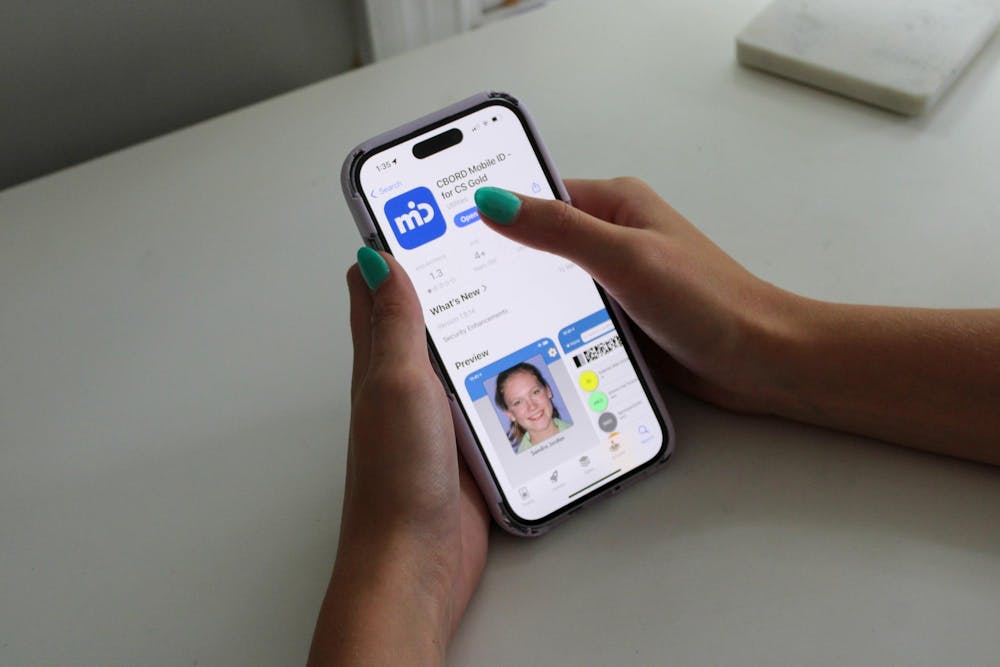In an effort to modernize and increase security on Grounds, the University is encouraging students to ditch their physical ID cards for a digital certificate accessible via Apple Wallet. Students, faculty and staff may use the app in place of their physical ID card to access academic buildings, meal plans and Cav Cash, or they may choose to continue using their physical ID.
The Mobile ID cellphone app, which went inactive June 30 and allowed students to open academic buildings and dorms via their cellphones, has been replaced by a new U.Va. Mobile ID Wallet App, according to an email from Jennifer Wagner Davis, executive vice president and chief operating officer.
For iPhone users, the new mobile ID is accessible via the digital wallet in one’s phone after downloading the Atrium Campus Connect App and adding the pass to the Apple Wallet. The system utilizes an NFC tag, which is an embedded technology that allows two devices to communicate in close proximity such as a phone and a door’s NFC reader. After adding the mobile ID to their device, students simply tap the reader with their phone just as they would with the plastic card IDs.
Student reactions have been mixed, with some leaning toward keeping their physical ID card while others are enthusiastic for the change. Tvisha Bakshi, senior resident and third-year Commerce student, said that she and many of her resident advisor friends would prefer to use both the physical card and mobile system, and she also believes the University should install charging ports should an individual’s phone battery die, especially if their physical ID will no longer function.
“I do think [the digital wallet card] is nice, but I’m leaning towards not getting it,” Bakshi said. “The only con [to the physical card] people have really brought up is [you can] lose your ID or wallet.”
Bakshi said that iPhones are less common to lose, and if an iPhone runs out of battery when a student needs to access their ID, Express Mode with power reserve allows the user to retain the ability to make purchases and scan into buildings. This resource is available for up to five hours after the device’s battery runs out of power. Express Mode is turned on by default upon download.
Gabriel Garcia, resident advisor and fourth-year College student, is enthusiastic about switching over to the new system for its convenience. He said that because his credit card is also stored on his phone, it is easy to manage both from one device.
“The old mobile ID system was kind of a pain,” Garcia said. “It's so much better now, because it uses your phone's NFC tag to just tap and go, so now I don't have to worry about losing my wallet or having to bring my wallet out with me.”
The new system was piloted beginning July 7. According to University Spokesperson Bethanie Glover, the University decided to switch to the new system to offer the University a more effective security system than the previous mobile ID application.
“The change in mobile service is to offer students, staff and faculty a more modern and convenient option for accessing buildings across Grounds,” Glover wrote in a statement to The Cavalier Daily.
According to Glover, the new mobile ID system will not sacrifice the security that the previous system offered to the University and its students — rather it will enhance the security by safely storing personal information and safeguarding against unauthorized access.
“U.Va. Business Operations [worked] closely with our Information Technology Systems and the Department of Safety and Security to ensure the new vendor meets University standards related to identity integrity, authentication and personal information security,” Glover wrote.
Once students activate their Mobile ID, their corresponding physical ID will automatically deactivate — students must choose one mode of identification and may not opt into both. The Mobile ID is also accessible for Android users.
According to the Cavalier Card Office’s website, the University enacted this switch to enhance security, simplify the process of making purchases and accessing buildings and reduce plastic waste to support the University’s sustainability efforts.
“Support our sustainability effort and reduce plastic waste on Grounds,” the Mobile ID Wallet website reads.
U.Va. Mobile ID is free of charge, and University members may use the new system on up to two of their mobile devices. If students choose to continue using their physical ID, replacing a lost ID costs $25. If students have lost their physical card and seek a replacement, they may find the information to do so through the Cavalier Card Office.
With the former system, the mobile ID app allowed students to remotely open doors by entering their PIN, a feature Bakshi said she appreciated and used frequently. The current system does not allow for this usage, and instead of a PIN, it relies on biometric authentication — facial recognition or fingerprint — to access the digital card.
For additional questions, students are encouraged to contact the Cavalier Card Office at uvaid@virginia.edu or (434) 924-4508.







